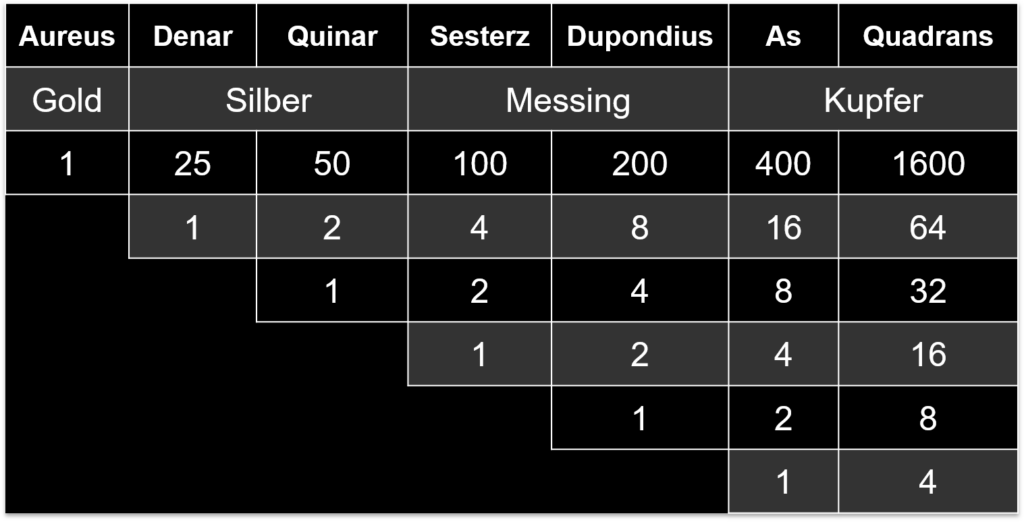Nicht alle römischen Kaiser waren beliebt, nicht alle Kaiser regierten lange, nicht alle Kaiser starben eines natürlichen Todes. In der heutigen Folge schauen wir uns die Ereignisse des Jahres 193 n. Chr. an. Wer konnte sich nach der Ermordung des Commodus als neuer Kaiser durchsetzen? Welche Rolle spielten die Soldaten dabei? Und wieso geht es dann doch immer ums Geld?
Folge 31 von Ausgesprochen Alt.
Über diese Quellen sprechen wir diese Folge:
- Aureus des Commodus: L AEL AVREL COMM AVG P FEL, Kopf des Commodus mit Löwenfell n. r. / HERCVL/ROMAN/AVGV, Keule umgebe von Kranz, RIC III 251 (Aureus), Münzkabinett der Staatlichen Museen zu Berlin
- Denar des Commodus: wie oben, RIC III 251 (Denar), American Numismatic Society
- Büste des Commodus mit Attributen des Hercules: Marmor, 191/2 n. Chr., Kapitolinische Museen
- Sesterz des Pertinax: IMP CAES P HELV PERTINAX AVG, Kopf des Pertinax n. r. / TR P COS II//LIB AVG, S-C, Pertinax sitzend auf Plattform, dahinter Bedienster, davor Liberalitas mit Füllhorn und Abacus, vor der Plattform Bürger, RIC IV.1 17, British Museum
- Denar des Didius Julianus: MP CAES M DID IVLIAN AVG, Kopf des Didius Julianus n. r. / CONCORD MILIT, Concordia frontal stehend, zwei Feldzeichen in den Händen, RIC IV.1 1, Münzkabinett der Univsersität Göttingen
Das Geldsystem im ersten und zweiten Jahrhundert
- Aureus: Gold, = 25 Denaren; Beispiel des Didius Julianus, RIC IV.1 5, British Museum
- Denar: Silber, = 4 Seseterzen oder 16 Asses; Beispiel des Augustus, RIC I² 207, American Numismatic Society
- Sesterz: Orchalcum (Messinglegierung), später Bronze = 4 Asses; Hauptrecheneinheit der Zeit, dort HS abgekürzt; Beispiel des Trajan, RIC II 401, Kunstsammlung der Ruhr-Universität Bochum
- Dupondius: Orichalcum, später Bronze, = 2 Asses; als Zeichen des doppelten As-Wertes trägt der Kaiser seit Nero auf diesem Münztyp eine Strahlenkrone; Beispiel des Nero, RIC I² 191, American Numismatic Society
- As: Kupfer, = 2 Semissen oder 4 Quadranten; Beispiel des Vespasian, RIC II²/1 305, Münzkabinett der Staatlichen Museen zu Berlin
- Seltene Nominale: Gold-Quinar (halber Aureus), Semis (halbes As), Quadrans (viertel As)

Die Versteigerung der Kaiserwürde
[…] when he [Didius Julianus] heard of the death of Pertinax, hastily made his way to the camp, and, standing at the gates of the enclosure, made bids to the soldiers for the rule over the Romans. Then ensued a most disgraceful business and one unworthy of Rome. For, just as if it had been in some market or auction-room, both the City and its entire empire were auctioned off. The sellers were the ones who had slain their emperor, and the would-be buyers were Sulpicianus and Julianus, who vied to outbid each other, one from the inside, the other from the outside. They gradually raised their bids up to twenty thousand sesterces per soldier. Some of the soldiers would carry word to Julianus, “Sulpicianus offers so much; how much more do you make it ?” And to Sulpicianus in turn, “Julianus promises so much; how much do you raise him ?” Sulpicianus would have won the day, being inside and being prefect of the city and also the first to name the figure twenty thousand, had not Julianus raised his bid no longer by a small amount but by five thousand at one time, both shouting it in a loud voice and also indicating the amount with his fingers. So the soldiers, captivated by this excessive bid and at the same time fearing that Sulpicianus might avenge Pertinax (an idea that Julianus put into their heads), received Julianus inside and declared him emperor.
Cassius Dio LXXIV, 11, 2-6 (Übersetzung: Earnest Cary)
Die letzten Worte des Septimius Severus an seine Söhne, Commodus und Geta
Be harmonious, enrich the soldiers and scorn all other men!
Cassius Dio LXXVII, 15, 2-3 (Übersetzung: Earnest Cary)
Jahresgehalt eines römischen Legionärs
Unter Augustus: 900 Sesterze
Unter Domitian: 1200 Sesterze
Unter Septimius Severus: 2400 Sesterze
Unter Caracalla: 3600 Sesterze
(Nach Wolters 1999, S. 223)
Literatur
- Reinhard Wolters, Nummi Signati. Untersuchungen zur römischen Münzprägung und Geldwitschaft, München 1999.
- Richard Abdy, The Severans, in: William E. Metcalf (Hrsg.), The Oxford Handbook of Greek and Roman Coinage (Oxford/New York 2012), 499-513.
Bildquellen
- Denar des Commodus: American Numismatic Society, Public Domain
- Denar des Pertinax: Münzkabinett der Universität Göttingen, CC BY-NC DE 4.0
- Denar des Didius Julianus: Münzkabinett der Univsersität Göttingen, CC BY-NC DE 4.0
- Denar des Pescennius Niger: American Numismatic Society, Public Domain
- Denar des Clodius Albinus: American Numismatic Society, Public Domain
- Denar des Septimius Severus: Münzsammlung der Heinrich-Heine-Universität Düsseldorf, CC BY-NC DE 3.0
(v.l.n.r)


